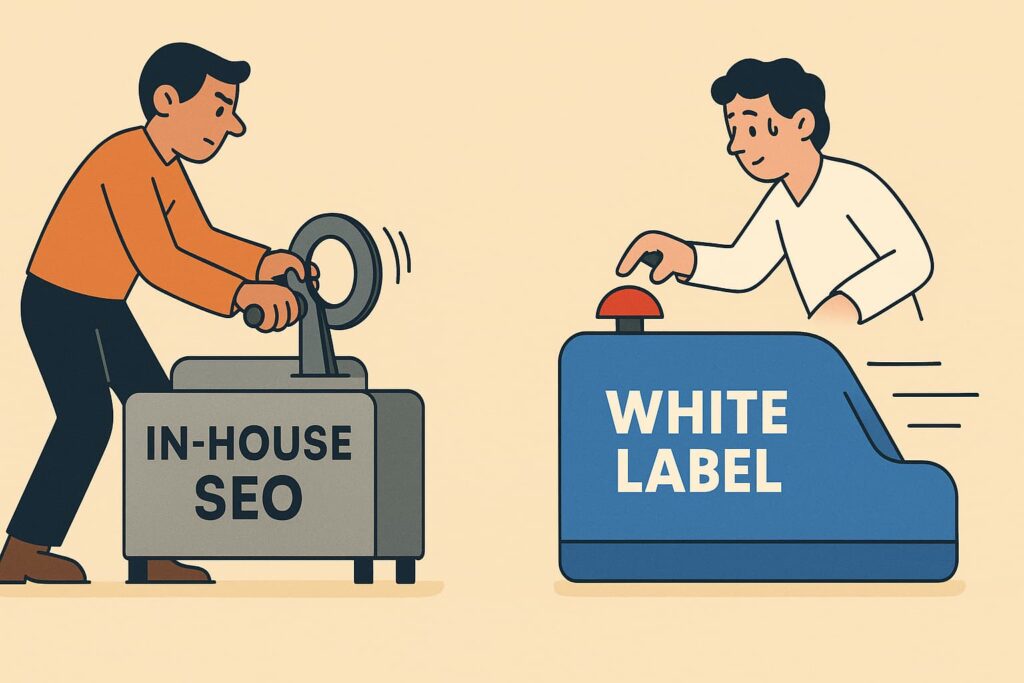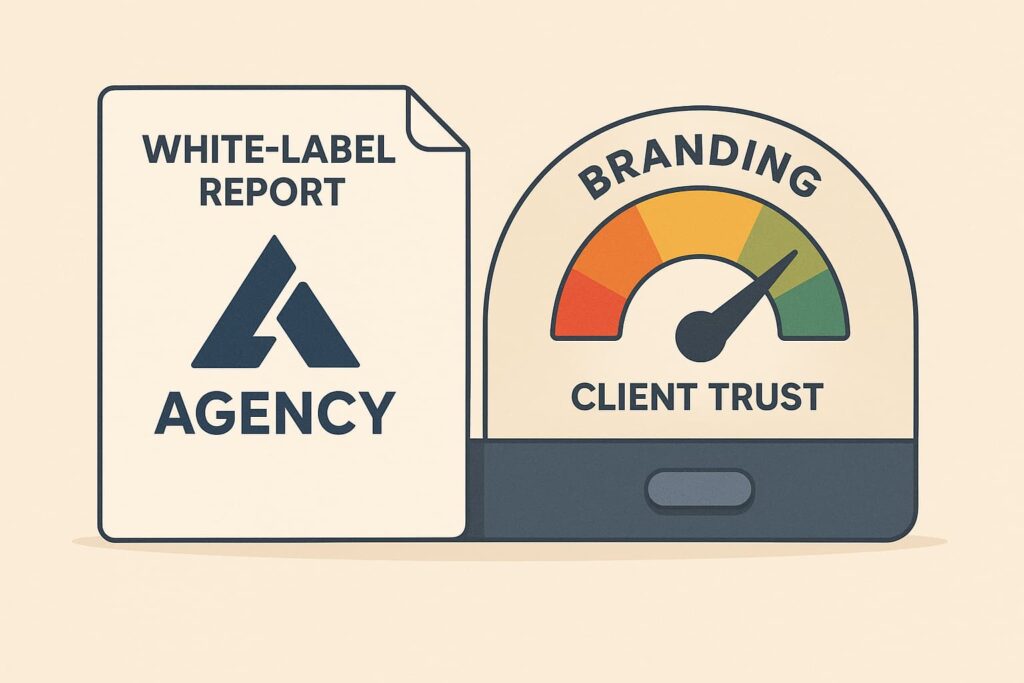Your website’s backlink profile can make or break your search engine performance. Get it right, and you’ll see rankings climb. Get it wrong, and you risk penalties that can tank your organic traffic. That’s why selecting the proper audit approach is so critical.
Most businesses weigh two options: outsourcing to white-label providers or building in-house capabilities. White-label services offer convenience and expertise on demand, while in-house solutions provide greater control and customization. The right choice depends entirely on your team’s skills, budget, and long-term digital strategy.
Understanding Link Audits
A link audit checks a website’s backlinks to uncover any problematic relationships that might hurt search rankings. The method begins with gathering all inbound links to generate a comprehensive backlink profile. Each link is then reviewed for quality, with spammy or unnatural links marked for removal.
The audit checks anchor text patterns to spot over-optimization that might appear manipulative. It also compares the site’s backlinks with competitors’ profiles to identify gaps. For confirmed toxic links, the audit creates disavow files to submit to search engines. Finally, it provides recommendations for building quality links to improve domain authority.
White-Label Link Audit Services
White-label link audit services let you offer professional backlink analysis under your own brand, while an expert team handles all the technical work behind the scenes. It’s like having an SEO department without the overhead, allowing you to expand your service offerings instantly.
Pros of White-Label Audits:
- No SEO Staff Required —The provider manages the entire audit process.
- Faster Completion Times — Experienced teams can deliver results quickly.
- Easily Scalable — Handle more clients without increasing headcount.
- Premium Tools Included – Gain insights from tools like Ahrefs and SEMrush without extra cost.
- Custom Branding — Reports appear under your brand, keeping client trust.
Cons of White-Label Audits:
- Less Control — You rely on the provider’s methods and accuracy.
- Recurring Costs — Monthly or per-audit fees add up over time.
- Limited Customization — Some providers offer rigid reporting formats.
A trusted example of a specialized link audit service is 3XE Digital. They perform in-depth backlink analysis, identify toxic links, and offer clear, actionable recommendations. Their process includes manual link removal, outreach, and disavow file creation. Unlike automated tools, their human-led approach ensures clients fully understand the results and next steps.
Who Benefits Most from White-Label?
For companies who want expert-level backlink research without the expense of hiring an internal SEO staff, white-label link audits are perfect. These services are often used by digital marketing firms to broaden their product offerings without having to recruit specialized experts. They’re also a wise choice for businesses that just need audits once in a while, as they do not demand expensive full-time employees or expensive SEO software subscriptions.
These services excel in situations requiring quick responses, such as handling unexpected Google penalties. White-label audits give scaling organizations the freedom they need to change capacity as required without having to commit to permanent employment.
The main advantage is that it’s affordable and convenient. Businesses get expert analysis and use of advanced tools without having to manage the process themselves. Although it involves giving up some control, this trade-off works well for those more focused on results than managing every detail.
In-House Link Audit Solutions
Your own team uses SEO tools and manual analysis to conduct an internal link audit. You have complete control with this method, but it takes resources and experience.
Pros of In-House Audits:
- Full control over link decisions
- One-time tool costs, no recurring fees
- Customizable processes
- Complete data privacy
Cons of In-House Audits:
- Pricey tool subscriptions (Ahrefs/Moz/SEMrush)
- Slow for large sites
- Needs SEO expertise
- Requires ongoing training
Who Benefits Most from In-House Audits?
Organizations that require complete control and have the means to keep them up to date are the ideal candidates for in-house link audits. Because they can distribute tool expenses across several clients while keeping consistent practices, SEO services that regularly audit their clients find this technique to be cost-effective.
Big businesses with complex backlink networks frequently need internal resources for customized research that goes beyond routine reporting. To ensure data security and compliance, businesses in regulated sectors like healthcare and finance prefer to keep audits internal.
In order to maximize the return on their current efforts, businesses who currently pay for expert SEO solutions sometimes switch to internal audits. Because internal audits enable more thorough analysis and strategic planning, this strategy is especially appropriate for businesses who prioritize long-term SEO growth above temporary solutions.
Which Option Is Right for You?

As each strategy has unique benefits based on your unique situation, choosing between white-label and in-house link audit services isn’t always easy. To assist you in making an educated decision that matches your strategic goals and operational skills, let’s take a closer look at these possibilities.
When White-Label Services Make the Most Sense
White-label link audits work well for digital agencies and marketing firms that want to offer SEO services without building an in-house team. These services let businesses add SEO audits to their offerings without hiring new staff or training existing employees. Agencies can focus on their main services while still delivering quality audits.
This approach also gives access to advanced SEO tools like Ahrefs and SEMrush without paying for full subscriptions. It turns fixed software costs into manageable, per-project expenses. Providers usually deliver audits quickly, which is useful when dealing with issues like Google penalties or sudden ranking drops. For agencies that need speed, flexibility, and fewer internal demands, white-label services are a practical option.
Situations Where In-House Audits Are Preferable
Established SEO teams often find in-house audits deliver superior long-term value, especially when handling multiple accounts. While professional tools require significant investment, their costs become justified when spread across frequent audits, ultimately proving more economical than white-label services.
The greatest advantage is complete control. Internal teams can customize every analysis detail — from competitive benchmarks to reporting metrics — crucial for specialized industries with unique compliance needs. This customization ensures audits precisely address specific business requirements rather than following generic templates.
In-house auditing produces important institutional information in addition to immediate benefits. Over time, teams get a better understanding of backlink patterns, which facilitates more sophisticated analysis and strategic decision-making. This consistency makes it easier to follow long-term SEO objectives and identify any ranking risks early.
Can You Combine Both Approaches?

A hybrid solution provides the best of both worlds, according to many firms. You may outsource specialty instances or overflow work to white-label vendors while managing key client audits internally. This well-rounded strategy enables you to:
- Maintain control over your most important accounts
- Scale capacity during busy periods without permanent hires
- Access specialized expertise when needed (like penalty recovery)
- Optimize costs by only paying for external audits when necessary
For example, an agency might use in-house audits for their top 20 clients while white-labeling audits for smaller accounts. Or a corporate team could handle routine monitoring internally, but bring in white-label help for annual comprehensive reviews. The key is matching each project’s importance and complexity to the right solution.
Final Thoughts
Choose white-label audits for cost-effective, quick results without needing in-house expertise—ideal for agencies and businesses with occasional needs. Opt for in-house solutions if you require full control, handle frequent audits, or work in regulated industries. Many find a hybrid approach works best, blending white-label convenience with strategic in-house oversight for optimal results. Match your choice to your budget, expertise, and SEO goals.
